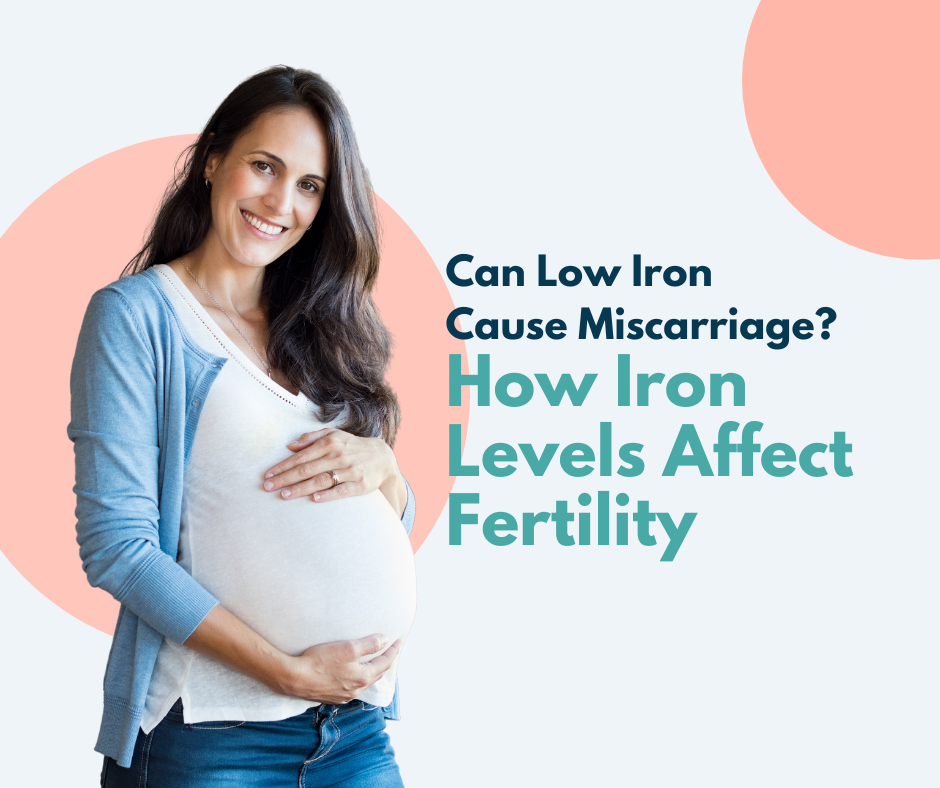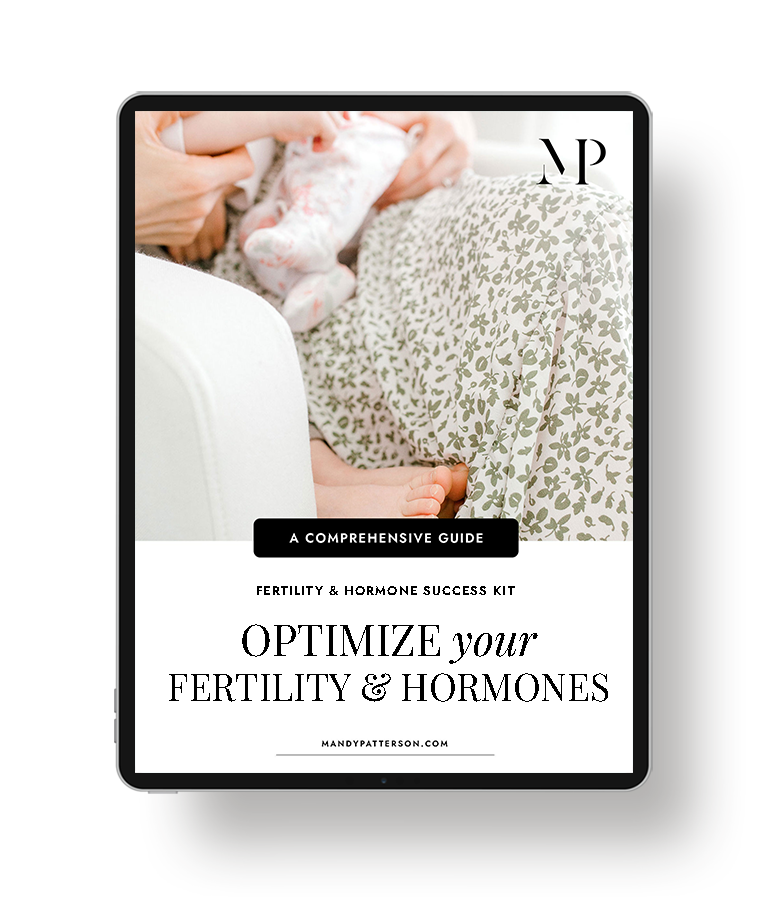Iron deficiency is a common nutritional deficiency among women of reproductive age. It is the most widespread nutritional deficiency in the world and the most frequent cause of anemia during pregnancy. With that in mind, can low iron cause miscarriage?
That’s the question I’m going to answer in this article, as well as how iron levels affect fertility and how to restore iron levels to an optimal range for pregnancy and conception.
What is Iron Deficiency Anemia?
Anemia occurs when your blood contains less than the normal amount of red blood cells (RBC’s), and more commonly if your red blood cells don’t have enough hemoglobin.
Hemoglobin is an iron-rich protein that gives your blood its red color. It helps bind oxygen, fight infections, and prevent blood loss by inducing blood clotting. If you have anemia, your body does not get enough oxygen-rich blood.
Iron deficiency anemia is the most common type of anemia.
It occurs when your body doesn’t have enough iron, which is needed to make hemoglobin. When there isn’t enough iron in your blood, the rest of your body can’t get the amount of oxygen it needs.
Symptoms of iron deficiency anemia include:
- Tiredness or weakness
- Headaches
- Dizziness
- Shortness of breath
- Rapid or irregular heartbeat
- Numbness or a cold feeling in your hands and feet
- Low body temperature
- Pale skin
- Chest pain
- Irritability
- Trouble concentrating
Who is at Risk for Anemia During Pregnancy?
When you are pregnant, your volume of blood increases. As such, more iron and vitamins are needed to make more red blood cells. If you don’t have enough iron, it can cause anemia.
Specifically, during pregnancy, your baby uses your red blood cells for growth and development.
This is especially true during the last three months of pregnancy. If you have extra red blood cells stored in your bone marrow before you get pregnant, your body can use those stores during pregnancy.
However, women who don’t have enough iron stores can develop iron-deficiency anemia. They are more at risk for anemia during pregnancy. Let’s not forget, this is the most common type of anemia in pregnancy.
Other risk factors for anemia during pregnancy include:
- Being pregnant with twins
- Vomiting a lot due to severe morning sickness
- Little time between pregnancies
- History of anemia
- History of a heavy menstrual flow
- Not consuming enough iron in your diet
So, low iron levels during pregnancy are common but can low iron cause miscarriage?

According to a study published in the European Journal of Endocrinology, around 35 percent of expectant mothers may be at risk of pregnancy complications – such as miscarriage or preterm birth – as a result of iron deficiency.
Can Low Iron Cause Miscarriage?
According to a study published in the European Journal of Endocrinology, around 35 percent of expectant mothers may be at risk of pregnancy complications – such as miscarriage or preterm birth – as a result of iron deficiency.
Here’s the thing, women need more iron during pregnancy to make the additional blood cells needed for fetal and placental growth.
When iron deficiency anemia is present there is a lack of oxygen in the blood of the mother and fetus. This may lead to fetal hypoxia, premature birth, and even perinatal or maternal mortality.
However, there is a lack of studies determining the potential contribution of iron deficiency to miscarriage.
Despite that, one study including 1568 pregnant women showed that iron levels gradually decreased as the pregnancy progressed. One-third of pregnant women had iron deficiency during the first and second trimesters. This rate increased up to 43% during the last trimester.
The results of the study found that a lower iron concentration was found in women who miscarried as compared to the control patients (uneventful, full-term healthy pregnancy).
While the difference was minor, researchers concluded that it was statistically significant. This means that the slight difference seen was real.
Can low iron cause miscarriage? The jury is still out as we cannot conclude from only one or two studies that low iron causes miscarriage.
However, low iron levels can contribute to other poor health outcomes during pregnancy as you’ll see below.
Iron Deficiency and Thyroid Function in Pregnant Women
Likewise, iron aids the functioning of a protein called thyroid peroxidase (TPO), which is crucial for the production of thyroid hormone. You see, iron is stored in almost all tissues of the body in the form of a protein called ferritin. Ferritin is a biomarker of thyroid function.
One study found that serum ferritin levels were shown to be reduced in hypothyroid patients as compared to control patients. Another study found that 35 percent of expectant mothers in the study had iron deficiency, and 10 percent had thyroid autoimmunity.
In that same study, measurements of thyroid hormone levels showed that 20 percent of the pregnant women with iron deficiency had subclinical hypothyroidism, where levels are mildly elevated.
Pregnant women need to produce enough thyroid hormone for their babies’ brains to fully develop. This is particularly important in the first trimester of pregnancy when the fetus has yet to develop its own thyroid gland.
Iron deficiency may not directly cause miscarriage, but it could cause a thyroid disorder during pregnancy.
Low iron levels can also impact your fertility. For example, iron deficiency has been linked to infertility, low birth weight, and preterm labor. According to research, women with inadequate iron stores are more likely to suffer from anovulation, meaning they fail to ovulate. As we all know, when you fail to ovulate pregnancy is essentially impossible.
Low Iron Levels and Fertility
Low iron levels can also impact your fertility. For example, iron deficiency has been linked to infertility, low birth weight, and preterm labor. According to research, women with inadequate iron stores are more likely to suffer from anovulation, meaning they fail to ovulate. As we all know, when you fail to ovulate pregnancy is essentially impossible.
While this may sound discouraging all is not doom and gloom! The good news is that researchers have found that women who supplement with iron regularly decrease their risk of infertility by 40 percent. Additionally, maternal nutritional status directly affects fetal growth and development.
How To Restore Iron Levels
With that being said, let’s talk about how to restore iron levels.
Iron Vs. Ferritin
Ferritin is a protein that stores your body’s iron, whereas iron is the amount of iron present in your blood. Understand that ferritin is the measure most often used to determine your body’s iron status.
What’s Considered Normal?
Labs for ferritin have a massive “normal” range. If you’ve been trying to conceive or are pregnant and unsure if you have iron deficiency anemia you’ll want to understand what’s normal versus what’s optimal.
For example, the normal values range from approximately 20 – 200 ng per mL in women. However, when trying to optimize your health here is a better way to look at it:
- Unhealthy (Iron deficiency): below 11 ng per mL
- Suboptimal (Reduced stores): 30-60 ng per mL
- Optimal: above 50 ng per mL
When you work with a functional medicine practitioner they will be able to interpret your lab work and help you achieve optimal levels.
Can Low Iron Cause Miscarriage – How To Flip the Script
There are many factors involved in a miscarriage and you’ll often never determine the exact causes. Pregnancy loss is difficult and if you’ve ever experienced a miscarriage you understand the pain and drive to optimize your health for the future.
Can low iron cause miscarriage – maybe not? But it’s certainly something you want to avoid and address if you have. Here are a few ways to flip the script on low iron levels.
RELATED: NATURAL REMEDIES FOR ANEMIA TO BOOST IRON LEVELS
Supplements
Iron supplementation is a great place to start. Prenatal vitamins usually don’t include iron due to their effect on your digestion, so make sure to take a separate iron supplement in addition to your prenatal. Remember, always have your iron levels checked by a healthcare provider before beginning supplementation.
Also, to ensure you are absorbing as much iron as possible pair your iron supplement with nutrients that boost its absorption. For example, vitamin C, B12, and folate enhance iron absorption. A good practice is to wash your iron supplement down with a glass of orange juice.
Diet
Incorporating iron-rich foods into your diet can provide major fertility benefits! There’s no mystery behind good nutrition and a balanced diet.
Consider adding lean chicken, turkey, salmon, tuna, and eggs to your diet. Other foods that are rich in iron include
- Peas, beans, and lentils
- Nuts and seeds
- Dried fruits like prunes, raisins, and figs
- Dark green leafy vegetables (kale, broccoli, spinach)
- Whole grains such as oatmeal
Work With a Fertility Coach
As a Certified Holistic Health and Fertility Coach, I use functional labs and lifestyle medicine protocols to help you optimize your health. In addition to natural remedies for anemia, I’ll help you investigate all areas of your life where you can improve your health. Reach out to me via my contact page to learn more!
Mandy Patterson

















